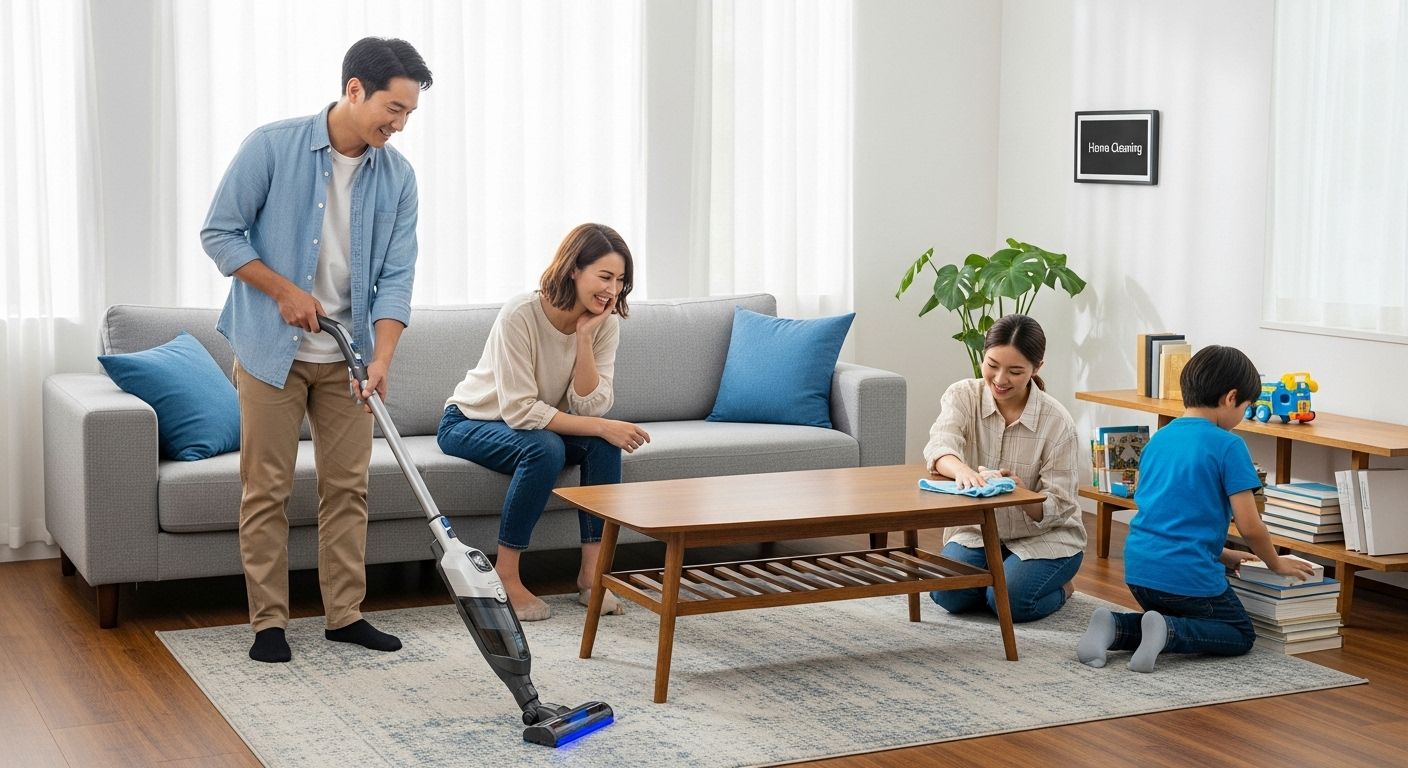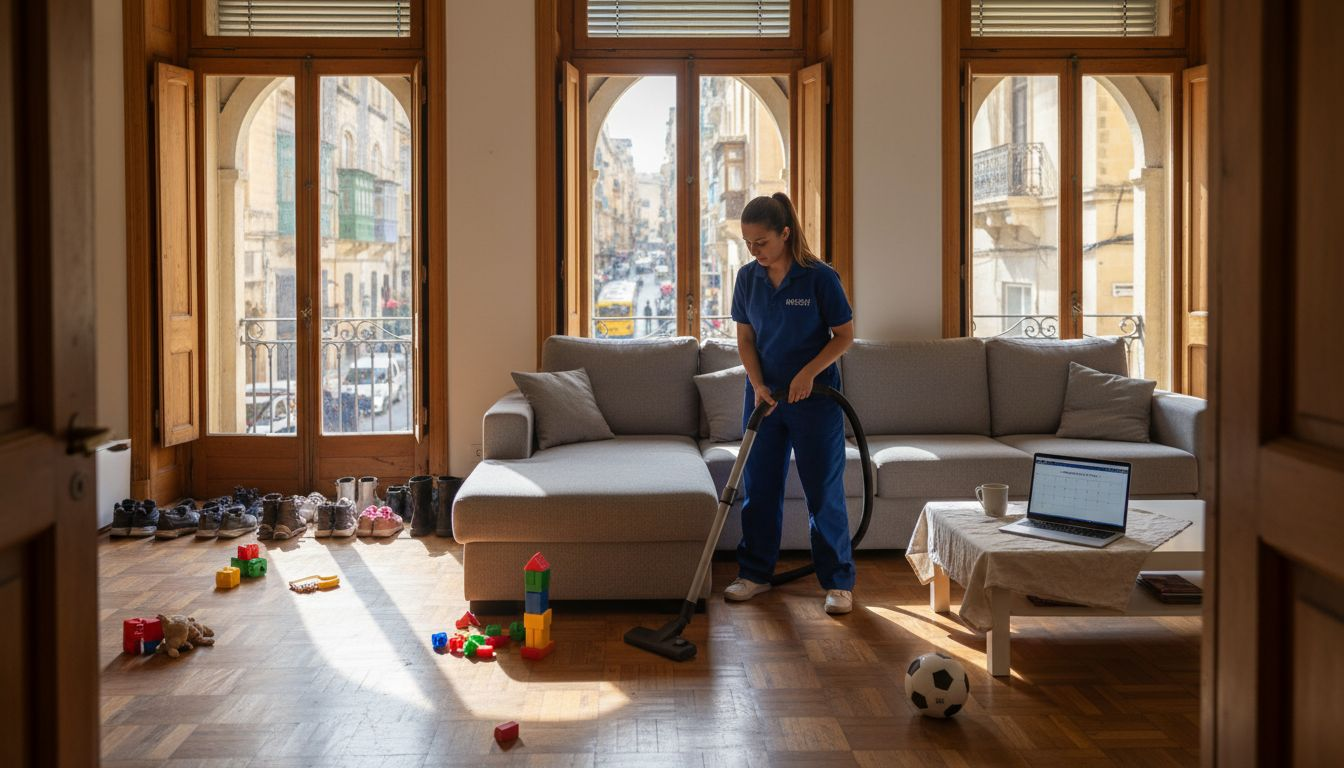Home cleaning sounds simple enough and most people do it without a second thought. But research shows that systematic cleaning can actually interrupt the transmission cycle of harmful pathogens and protect your health. This means every swipe of a sponge is really a step toward a healthier and more peaceful life not just a matter of keeping things tidy.
Table of Contents
- What Is Home Cleaning And Its Importance?
- Why Home Cleaning Matters For Health And Well-Being
- How Home Cleaning Works: The Science Behind It
- Key Concepts Of Effective Home Cleaning Practices
Quick Summary
| Takeaway | Explanation |
|---|---|
| Regular cleaning boosts health. | Consistent cleaning helps eliminate allergens and pathogens, reducing health risks. |
| Cleaning improves mental well-being. | A clean environment can lower stress and enhance productivity, fostering a sense of accomplishment. |
| Use effective cleaning techniques. | Tailored approaches and appropriate cleaning agents improve cleaning efficiency and surface preservation. |
| Understand contamination management. | Identify high-risk areas and implement targeted cleaning strategies to enhance health protection. |
| Cleaning is a proactive health strategy. | Systematic cleaning protects against health issues and maintains a safe living space. |
What is Home Cleaning and Its Importance?
Home cleaning goes beyond simply making spaces look neat. It represents a comprehensive approach to maintaining health, hygiene, and overall living quality. Professional cleaning services recognize this as more than a routine task but a critical lifestyle practice.
The Health Dimension of Cleaning
Cleaning is fundamentally about protecting human health. According to Rush Medical Center, regular home cleaning helps control critical environmental factors that directly impact wellness. The process eliminates harmful microorganisms, reduces allergen accumulation, and creates a safer living environment.
Key health benefits of consistent home cleaning include:
- Reducing respiratory irritants like dust and pet dander
- Minimizing potential pathogen transmission
- Creating a stress-free living space that supports mental well-being
Understanding Cleaning as a Preventative Practice
Home cleaning transcends aesthetic appeal. It functions as a preventative health strategy that addresses potential risks before they become significant problems. By systematically removing dirt, dust, and potential contamination sources, individuals can protect themselves from various health complications.
Professional cleaning approaches recognize that different surfaces and environments require tailored cleaning techniques. Thorough cleaning involves understanding material compositions, appropriate cleaning agents, and strategic approaches that maintain both cleanliness and surface integrity.
The importance of home cleaning extends beyond immediate visual results. It represents an investment in personal health, property maintenance, and overall quality of life. Regular, methodical cleaning practices contribute to creating living spaces that support physical health, mental clarity, and personal well-being.
Why Home Cleaning Matters for Health and Well-Being
Cleaning is not merely a cosmetic activity but a fundamental practice that significantly impacts human health and psychological wellness. The Cleaning Craze: Everyone’s Suddenly Talking About Cleaning highlights the growing recognition of cleaning’s broader implications beyond surface-level aesthetics.
Psychological Benefits of a Clean Environment
A clean living space directly influences mental health and emotional states. According to research from the National Institutes of Health, organized and sanitized environments reduce stress levels, improve cognitive function, and create a sense of personal control.
Key psychological advantages of maintaining a clean home include:
- Reducing anxiety and mental clutter
- Enhancing personal productivity
- Creating a sense of accomplishment and well-being
Physical Health Protection Mechanisms
Home cleaning serves as a critical defense mechanism against potential health risks. Systematic cleaning interrupts pathogen transmission cycles, preventing the spread of infectious diseases and minimizing exposure to harmful microorganisms.
The cleaning process involves strategic interventions that protect physical health:
- Eliminating dust and allergen accumulation
- Preventing mold and bacterial growth
- Reducing potential respiratory irritants
Beyond immediate health protection, consistent cleaning practices contribute to long-term wellness by maintaining environments that support physical and mental resilience. The interconnection between clean spaces and personal health underscores cleaning’s role as a proactive health management strategy.
The following table summarizes the psychological and physical health benefits of maintaining a clean home, organizing the article’s core points in a concise comparison format for easier reference.
| Benefit Type | Key Effects | Article Reference |
|---|---|---|
| Psychological | Reduces anxiety and mental clutter | Psychological Benefits of a Clean Environment |
| Enhances personal productivity | Psychological Benefits of a Clean Environment | |
| Creates a sense of accomplishment and well-being | Psychological Benefits of a Clean Environment | |
| Physical Health | Eliminates dust and allergen accumulation | Physical Health Protection Mechanisms |
| Prevents mold and bacterial growth | Physical Health Protection Mechanisms | |
| Reduces potential respiratory irritants | Physical Health Protection Mechanisms | |
| Minimizes potential pathogen transmission | The Health Dimension of Cleaning |
How Home Cleaning Works: The Science Behind It
Home cleaning represents a sophisticated interaction between chemical compounds, mechanical actions, and strategic techniques designed to remove contaminants. Why Watching Other People Clean Feels So Good might capture popular imagination, but the real magic lies in understanding the scientific principles driving effective cleaning.
Chemical Interaction and Contamination Removal
At its core, cleaning involves breaking down and removing unwanted substances through precise chemical mechanisms. According to research from the National Institutes of Health, cleaning agents utilize specific molecular structures that interact with dirt, grease, and microorganisms.
Key scientific principles underlying cleaning processes include:
- Surfactant molecules that reduce surface tension
- Chemical bonds that dissolve and lift contaminants
- Mechanical agitation that enhances removal efficiency
Microbial Disruption and Surface Sanitation
Effective cleaning goes beyond visible dirt removal, targeting microscopic organisms that can compromise health. The process involves disrupting bacterial cell structures and preventing microbial reproduction through targeted chemical interventions.
Critical cleaning mechanisms work by:
- Denaturing protein structures in microorganisms
- Destroying cellular membranes
- Creating environments hostile to microbial survival
Understanding cleaning as a scientific practice reveals it is not simply about appearance but a complex biochemical process that protects human health through strategic molecular interactions. The intricate dance of chemical compounds and mechanical techniques transforms seemingly simple cleaning into a sophisticated health maintenance strategy.
Key Concepts of Effective Home Cleaning Practices
Effective home cleaning requires more than random actions or sporadic efforts. The Cleaning Craze: Everyone’s Suddenly Talking About Cleaning demonstrates growing public awareness about systematic cleaning approaches that maximize efficiency and health protection.
Strategic Cleaning Methodology
Professional cleaning experts emphasize the importance of structured approaches that go beyond surface-level maintenance. According to Environmental Protection Agency guidelines, effective cleaning involves deliberate strategies that address different surfaces and contamination types.
Key strategic principles include:
- Understanding surface-specific cleaning requirements
- Utilizing appropriate cleaning tools and agents
- Developing consistent cleaning routines

Comprehensive Contamination Management
Effective cleaning transcends visible dirt removal, focusing on comprehensive contamination management across multiple environmental dimensions. This holistic approach requires understanding how different spaces accumulate and harbor potential health risks.
Critical management strategies involve:
- Identifying high-touch and high-risk areas
- Implementing targeted cleaning protocols
- Recognizing varying contamination transmission mechanisms
Home cleaning is a sophisticated practice that combines scientific understanding, strategic planning, and consistent execution. By approaching cleaning as a comprehensive health management system, individuals can transform routine maintenance into a proactive wellness strategy that protects both physical environments and personal health.

Simplify Home Cleaning Without Sacrificing Quality or Health
Are you tired of choosing between a clean home and keeping up with your busy schedule? This article highlights how professional home cleaning isn’t just about appearances but is vital for your health, mental clarity, and overall well-being. With rising demands on your time, it is easy to let cleaning routines slide, but the risks to your health and peace of mind only grow. Discover how Cleaning in Malta meets today’s modern lifestyle by making it effortless to protect your home and your loved ones. Let us help you achieve the balance that matters most.

Take action today—visit Rozie to experience fast booking, expert cleaners, and Malta’s best customer support. When your schedule is full, give yourself more time and better health. Book your service now and enjoy a cleaner home with less effort! For more insights and updates, be sure to check out our Rozie Blog.
Frequently Asked Questions
What are the health benefits of regular home cleaning?
Regular home cleaning helps eliminate harmful microorganisms, reduce allergens, and create a safer living environment. It contributes to respiratory health by minimizing irritants like dust and pet dander, which can improve overall well-being.
How can I maintain a clean home efficiently?
To maintain a clean home efficiently, develop a structured cleaning routine tailored to your living space. Focus on high-touch areas, utilize appropriate cleaning tools and agents, and incorporate consistent cleaning schedules to keep your environment healthy and organized.
What cleaning techniques should I use for different surfaces?
Different surfaces require specific cleaning techniques. For example, use microfiber cloths for dusting, disinfectants for kitchen and bathroom surfaces to eliminate germs, and gentle cleansers for sensitive materials to preserve their integrity while ensuring cleanliness.
How does cleaning protect my physical health?
Cleaning protects physical health by disrupting pathogen transmission cycles and managing allergens. Systematic cleaning prevents the buildup of dust, mold, and harmful bacteria, reducing the risk of infectious diseases and supporting long-term wellness.



